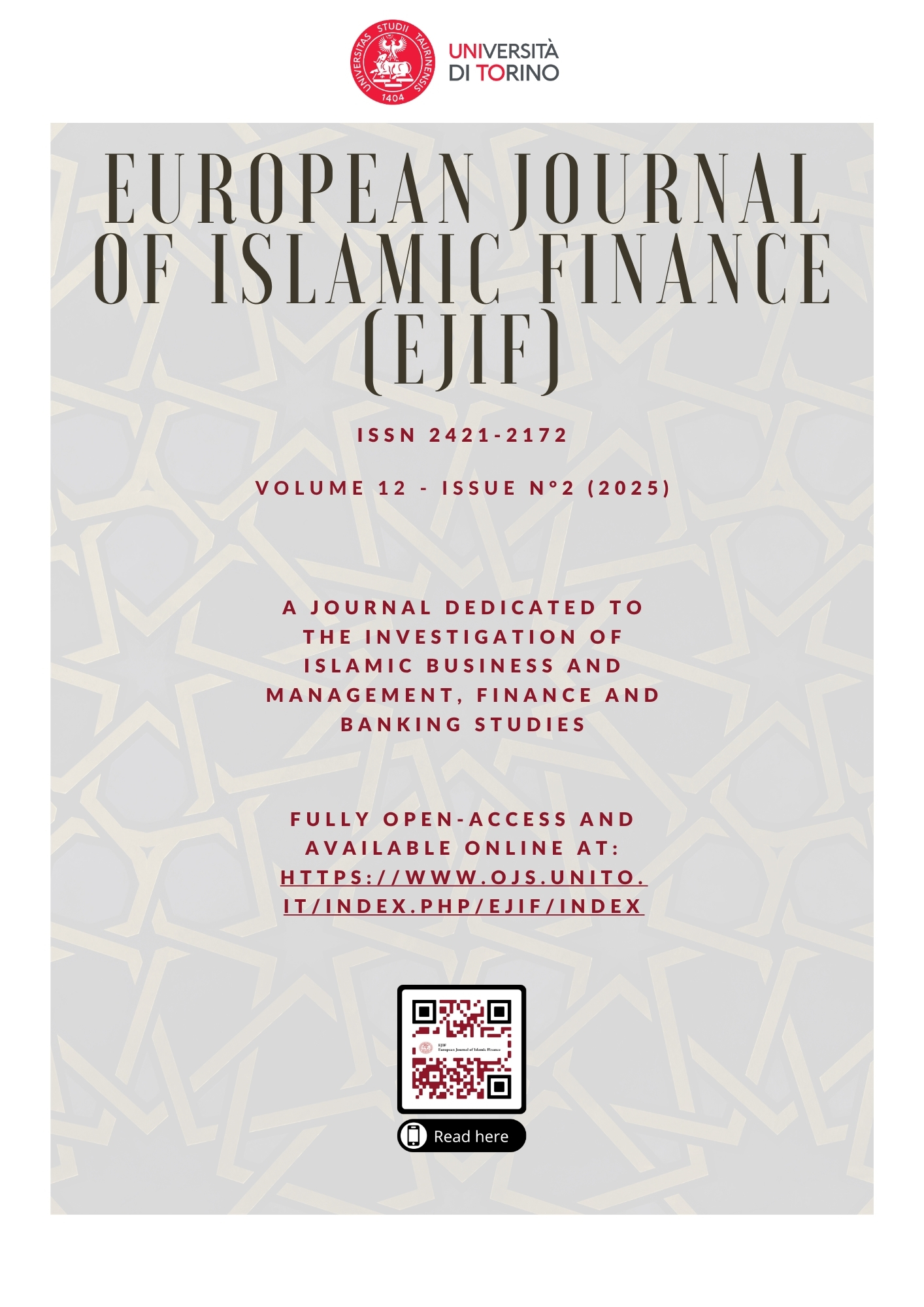Islamic Public Finance: How It Matters for Achieving SDGs
Islamic Public Finance
DOI:
https://doi.org/10.13135/2421-2172/10892Keywords:
zakāh, constitution, Baitulmal, wealth inequality, Islamic economic system, Sustainable Development Goals (SDGs)Abstract
The Sustainable Development Goals (SDGs) agenda is an important global agenda. Public finance, including Islamic public finance, is an essential financial agenda of a country, specifically for Islamic countries. However, both work towards the good welfare of people globally (via SDGs) and the country's people (via Islamic public finance). As both works parallelly, Islamic public finance plays a significant role in advancing SDGs through its unique principles and practices that emphasise social responsibility, ethical investments, and people's welfare. This is where this study aims to highlight the contribution of Islamic public finance towards sustainable development and stimulate discussion on the role of the Baitulmal authorities in the design and implementation of the SDGs. This study uses the narrative review and mapping method. The narrative review is done on past studies or articles on Islamic public finance instruments. The mapping method identifies the motives of each Islamic public finance instrument and then links them to each goal of the SDGs. The results show a gap in Islamic public finance elements in the current public finance practice. These few missing elements of Islamic public finance should be regarded as added value elements in the current practice of public finance that widen the scope, generating more revenues in public finance. With more sources of revenue in public finance, more funds could be spent on achieving the SDGs. Hence, the public finance policy is suggested to be constructed by adding the Islamic public finance elements, specifically for Islamic countries.
References
Ab Rahman, M. F., Thaidi, H. A., Baharuddin, A. S., Ab Rahman, A., & Ab Rahim, S. F. (2019). Expansion of Agricultural Zakat Revenue in Malaysia on the Basis of the Current Maslahah. Al-Jami'ah: Journal of Islamic Studies, 57(1), 231-256. 10.14421/ajis.2019.571.231-256.
Ali, K.M. and S Kassim (2020). Waqf Forest: How Waqf Can Play a Role In Forest Preservation and SDGs Achievement? Etikonomi Volume 19 (2), 2020: 349 – 364.
Baskaran, T. and L.P., Feld (2013). Fiscal decentralisation and economic growth in OECD countries. Is there a relationship?, Public Finance Review 41(4): 421–445.
Baznas (2017). The role of zakat in supporting the Sustainable Development Goals. BAZNAS-UNDP Report: Jakarta.
David P. Farrington, D.P., and D., Jolliffe (2017) Special issue on systematic reviews in criminology. Aggression and Violent Behavior 33: 1-3
Ika Yulita, Nurwahidin, Fahruroji and Muhammad Zilal Hamzah (2020) The National Board of Zakat Republic of Indonesia Strategy in Managing the Zakat Potential in Agricultural Sector. Paper presented at the 4th International Conference of Zakat, 7-8 October, Surabaya, Indonesia. [accessed Jul 24, 2024].
Ismail, A.G. and W.A. Pratomo (2021). Constitutional Rules on Waqf and Fiscal Policy Outcomes. Sriwijaya Law Review 5 (Issue no. 2): 262-272. DOI: 10.28946/slrev.Vol5.Iss2. 1169.pp262-272.
Ismail, A.G., M.H.M., Shafiai and R.M., Ramli (2022) Al Mal: Exploring the Economic Impacts. Bangi: UKM Press.
Ismail, A.G., R. Abdullah and M.H., Zaenal (2022). Islamic Philanthropy: Exploring Zakat, Waqf, and Sadaqah in Islamic Finance and Economics. New York: Palgrave McMillan.
Jimenez, B. S. (2009). Fiscal Stress and the Allocation of Expenditure Responsibilities between State and Local Governments: An Exploratory Study. State and Local Government Review 41(No. 2): 81-94.
Mouritzen, E. (1992). Managing Cities in Austerity, Urban Fiscal Stress in Ten Western Countries. Newbury Park, CA: Sage Publications.
Possumah, B. T. and Ismail, A. G. (2012). Public Wealth Management by Baitul Mal and Legal Constraint. Third International Workshop in Islamic Economics Theory, Jogjakarta, 19-20 June 2012. Retrieved from https://www.ukm.my/ekonis/wp-content/uploads/2021/02/Public-Wealth-Management-by-Baitul-Mal-and-Legal-Constraint.pdf
Shaikh, S.A., AG Ismail, MH Mohd Shafiai (2017). Application of waqf for social and development finance. ISRA International Journal of Islamic Finance 9 (Issue No. 1): 5-14.
Shaikh, S.A., and AG Ismail (2017). Role of zakat in sustainable development goals. International Journal of Zakat 2 (Issue No 2): 1-9.
Schick, A. (1980). Fiscal Stress and Public Policy: Budgeting Adaptations to Resource Scarcity. Beverly Hills, CA: Sage Publications.
Siddiqi, M. N. (1992). Teaching public finance in Islamic perspective. Jeddah: Centre for Research in Islamic Economics King Abdul Aziz University.
Sun Y, Zhu D, Zhang Z, Yan N. Does Fiscal Stress Improve the Environmental Efficiency? Perspective Based on the Urban Horizontal Fiscal Imbalance. Int J Environ Res Public Health. 2022 May 21;19(10):6268. doi: 10.3390/ijerph19106268. PMID: 35627805; PMCID: PMC9141185.
Downloads
Published
How to Cite
Issue
Section
License
Copyright (c) 2025 Abdul Ghafar Ismail, Nur Hannani Abdul Ghafar, Nurdiyana Sabrina Binti Abdul Rahman

This work is licensed under a Creative Commons Attribution-ShareAlike 4.0 International License.
EJIF content is licensed under a Creative Commons Attribution 4.0 International License.
Authors keep the copyrights for their work and give the journal the work's first publication copyright, which is at the same time licensed under a Creative Commons License – Attribution, which in turn allows other parties to share the work with an acknowledgement of the work's authorship and initial publication in this journal.


 EJIF has been approved for inclusion in
EJIF has been approved for inclusion in  EJIF has been approved for inclusion in
EJIF has been approved for inclusion in  EJIF is a member of
EJIF is a member of  EJIF is listed in the ANVUR (Italian National Agency for the Evaluation of Universities and Research Institutes) as a scientific journal in both
EJIF is listed in the ANVUR (Italian National Agency for the Evaluation of Universities and Research Institutes) as a scientific journal in both 
